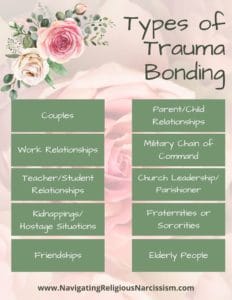Reviewed by Karis A. Williams, MSMHC, LPC, January 13, 2024
Trauma bonding is a condition that leaves many people scratching their heads. They ask questions like, “If someone is being abused, why don’t they just leave?” or, “Why does that person act as though they like or even love their abuser?” It is unfortunate to see what abuse can do to a person’s perception. And trauma bonding can occur in many different types of relationships and situations. So, what are they?
Table of Contents
What are the Types of Trauma Bonding?
There are several types of trauma bonding, but here are some of the most prevalent ones:
- Couples
- Parent/child relationships
- Work relationships
- Military chain of command relationships
- Teacher/student relationships
- Church leadership/layperson or child relationships
- Kidnappings
- Hostage Situations
- Fraternities/sororities
- Friendships
- Elderly people
Further, there are different types of abuse that are used in all of these cases. The most prominent forms of abuse are physical, emotional, psychological, financial, sexual, spiritual, and verbal. They generally occur in a combination of multiple forms and often most of the forms in conjunction with one another.
A Common Thread in All Types of Trauma Bonding
Anybody can form a trauma bond with an abuser. There is no distinction between the highly educated vs. uneducated, rich vs. poor, extrovert vs. introvert, or really any other distinction. What IS common is that a victim of trauma bonding has not had healthy relationships in the past. Because of this, they are not able to recognize the warning signs that will allow them to get to safety.
Those that DO have a history of healthy relationships will generally see what is going on and make the necessary adjustments, whether that be to make healthy changes within the relationship or just leave the relationship because it shows little to no potential to become healthy. They will rarely stay in a relationship that they know is harming them.
Unless a trauma bonding victim sees what is going on and takes the steps needed to become emotionally and relationally healthy, they will continue to attract abusers who see them as easy prey. And it will be hard for them to find healthy relationships. This is so unfortunate, because many victims of trauma bonding are acually highly empathetic people. They certainly don’t deserve the treatment they get. But they end up paying for feeling the need to help and encourage people that will only treat them poorly.
A Look at Each of the Types of Trauma Bonding
An abuser will often work among several different types of relationships. That doesn’t mean all of them. In fact, most abusers will not go to the lengths of kidnapping or hostage situations. But they will likely be at some level of abuse in most if not all of their personal relationships.
In the case of narcissism, not all of those relationships will necessarily look abusive, especially to those they are trying to impress or use as flying monkeys. But that doesn’t mean they aren’t abusive for the amount of damage they are doing to the victims of their abuse. It just means they have to get their narcissistic supply and build a reputation somehow. And that usually means love bombing a certain number of people they set aside to be their flying monkeys.
Couples
Of all of the types of trauma bonding, the occurrences of abuse between couples are probably higher than all of the other types of trauma bonding combined. That is because it is more personal and intimate than the other relationships. So much more happens behind closed doors. And that gives the abuser an opportunity to abuse in ways that confuse and belittle a victim, often without them knowing about it for years or even decades. Things don’t seem quite right, but because victims can’t put their finger on the exact issue, they don’t want to call it abuse. Or they may not even consider it abuse because it is so subtle and under-handed.

It is also very hard to reach out for help in the case of couples, especially in the case of a covert narcissist abuser. Nobody can see the abuse. They just see a wonderful productive member of society and often think the couple has a wonderful life together. The trauma bonded victim realizes this, which keeps them even more silent regarding the issues.
Trauma bonding victims feel like their feelings are not valid because nobody sees what they do and nobody would believe them if they said anything. Plus they don’t want “out” their partner because they don’t want any possiblity of wrongly accusing them of things. By this time their own judgment is so cloudy that they don’t have the ability to see what is really happening. For this reason, I stayed in a marriage for nearly 31 years even though I knew things weren’t right. This is a huge sign of trauma bonding. For more signs, click on this article.
For this reason, I stayed in a marriage for nearly 31 years even though I knew things weren’t right. And while most people were very supportive of me, there were a few very loud and obnoxious fans of my narcissistic ex that thought I was the problem (remember the reference to flying monkeys above?). Fortunately, I had the best counseling and was able to become healthy enough to leave all of that behind.
Parent/child relationships
This is the second most used type of trauma bonding. In the parent-child relationship, children are a captive audience. Generally speaking, they can’t just leave when things get tough. And because they are raised in their home from birth, this is the relationship model they learn from. So understanding how bad the relationship was is next to impossible. Realizing that it is not a healthy relationship is more possible.
It is possible to know things aren’t quite right. I had wonderful teachers at school from the time I was in kindergarten. Almost every single teacher I had treated me with kindness and empathy, something I did not receive at home. So I knew, based on how I was treated outside the home, that things were not right in the home. But there was no escape for me. So I bided my time until I could leave.
I could never tell people that things were bad. I had two sisters that were also just waiting for the day they could leave. My younger sister was emancipated at the age of 17. Most of the people outside of the home knew things weren’t quite right. But they weren’t getting involved to find out more. So they would support my sisters and me long distance.
I do remember telling my pastor about it when I was around 15 or 16. His answer to me was that I had no choice but to live with it until I was 18. I never told another person about it. And I left for the most part when I was 17. I got married at the age of 21. I left my abusive childhood home–and went straight into my husband’s abusive home.
Work relationships
Work relationships is the third most common type of trauma bonding. There are two reasons for this. First, most people spend most of their waking hours at their place of employment. And second, there is an obvious power imbalance.
When someone is working for an abusive boss, they don’t have the freedom to speak up. Their job could be at risk. And often it is not easy to just go get another job. They could fear public retaliation if the boss gets upset that they stand up for themselves or call out the boss’s bad behavior. If there is a size disparity, they can even feel physically threatened by their boss. Or in the case of abusive women, a male employee may be too shamed to report physical abuse by a much-smaller female boss.
To add to the complication, employeees can be trauma bonded to their boss because they feel sorry for them. Or because they feel the boss can’t do without them, so they stay on. And if the boss knows they feel this way, they will manipulate their employee even further to make them feel like they have to stay.

Military chain of command relationships
A couple of my counselors actually said that the Navy is one of the biggest places to find narcissists. And that most of them tend to bring it into their homes and use it on their families. Because of the higher than average incidents of narcissism in the military, as well as the chain of command structure, trauma bonding is almost a necessary way of life.
You can’t just quit your job, although there are a few back door ways to do it–most of which don’t get you an honorable discharge. So to say you feel trapped in your military requirement would be a pretty accurate assessment.
There is a huge punishment/reward system in the military. So trauma bonded victims will do what it takes to stay under the radar. And over time, they will start to justify the abuse. They will say that’s just how the military needs to run. Or they will feel sympathy for the difficult job their higher ranking officials are doing and excuse their behavior. They will say the stress level is so high for them that it is understandable that they could do some inscrupulous things under pressure. This is just one of the signs of trauma bonding. Here is a more complete list if you want to see it again. You can have nearly all of the different signs of trauma bonding in a military environment.
Teacher/student relationships
This is one of the types of trauma bonding that can do great damage in the time the relationship exists, but it is not an extremely long-term relationship, which is helpful. In most cases, the relationship betwee teacher and student won’t last for more than about 9 months. And as the student gets older, there will be many more teachers involved as classes rotate through the day. So the student may not feel as trapped.
That does not mean a teacher cannot be abusive and create trauma bonds with students in a limited capacity. Fortunately, this is not as common as the types of trauma bonding we have already covered.
I only remember one teacher that was really abusive. She was actually an assistant teacher at my small Christian school. And I did not feel endeared to her in any way. I stayed totally out of her way. I did try to stay under the radar with her. But there was no trauma bond at all. Nobody was feeling bonded to this teacher at all. That was because she wasn’t doing any love bombing or attempting to win people over to her. She was just using her authority to be mean and cruel.
Church leadership/layperson or child relationships
This is one of the types of trauma bonding that is very similar to the teacher/student relationship. It is not a time-heavy relationship. But because of the nature of the control a pastor/priest can have over parishioners, it is actually more influential than a teacher/student relationship would be.
Another reason church leadership can abuse others is because people in full time church ministry tend to have an automatic trust factor built into their job. People assume that someone who has dedicated their life to the care of others does it out of love. Unfortunately, that is not the case.
Everybody knows about the scandals that plague virtually every denomination of the church. Nearly all of those situations would have needed some level of trauma bonding in order to continue indefinitely. That is one of the reasons the Catholic church hid it’s sexual abuse for so many years. Many of the cases were children who felt powerless to do anything and kept silent until they were adults. Many others were people who were so isolated that they felt they were the only ones experiencing the abuse and couldn’t tell others about it. Nobody would ever believe them. And that turned out to be the case until there were too many stories to ignore anymore.
Kidnappings
This is actually one of the rarer types of trauma bonding. That is because the vast majority of people on the earth will not succumb to this level of evil. And for that I am grateful.
It is still a thing that happens. And it happens more often than we realize. Are you aware of the sexual slave trade that thrives in America? It is not new, but it is not something that most of us knew about until recently.
In order to make the trauma bond relationship work in these cases, victims are often drugged and sedated so they are unable to think clearly or fight back. While this is still a huge problem worldwide, there are many organizations trying to shine a light on it and save the victims who are unable to save themselves.
Hostage Situations
Hostage situations are also one of the less frequent trauma bonding types. And more often than not, in a hostage situation, the victim will not have previously known the abuser. For this reason, it is more of a Stockholm Syndrome scenario than a trauma bonding one, although a trauma bond IS formed.
The reason a trauma bond is formed in a hostage situation is because often the abuser takes good care of the hostage. His goal is not abuse. It is to get something else that he wants. Many hostage takers do intend to return the victim so they aren’t trying to do destructive things. And that sends a very mixed signal to the trauma bond victim. They start to see humanity in their abuser, and possibly even kindness. The hostage taker could even be trying to be especially kind to the victim because they already feel bad about disrupting the victim’s life. This is especially confusing to the victim and may even cause the victim to feel sympathy and sorrow for her abuser. The bond could be very tight.
After a hostage crisis, victims usually need extensive counseling to work their way through the process.
Fraternities/sororities
Fraternities and sororities are a bit of a different story than all of the previous types of trauma bonding. Because of hazing practices of some, victims expect to be abused to some degree. They trick their subconscious into thinking it is normal. And some people are so desperate to get into the “club” that they will be willing to submit to whatever it takes. I guess I don’t understand all the hype. I do understand the lifetime bonds of fraternities and sororities. There are some good benefits to that. And there are many that don’t have hazing practices and other harmful policies.
But for the ones that do, it is unfortunate that people think they have to go to such lengths for acceptance rather than valuing themselves enough to just walk away. This seems to be one of the most unnecessary forms of trauma bonding.

Friendships
Friendships are probably one of the most insidious types of trauma bonding because nobody really seems to see it coming. It isn’t borne out of an authoritary/submissive relationship. It would seem to start on equal terms. But then the imbalances will begin, but not all at once. It will be a slow decline. This is just like the frog/boiling water story. If you put the frog in room temperature water, he won’t jump out, even when the water begins to boil. By the way, the frog in boiling water, while a story everyone has heard, is actually not true. A frog will hit a point where the water is too hot and will jump out before he allows himself to boil.
Maybe that is a really good scenario because it points to the ability for someone who has been trauma bonded to see the danger they are in and flee to safety. And that is why I chose to share the frog story. It gives a modicum of hope!
But back to the friendship trauma bonding relationship. Because it is generally a gradual process, people don’t tend to see it. And often when they do, they don’t necessarily leave the friendship over it. They see the nice things that friend will do for them or with them. And they consider that valuable enough to hold onto the friendship. Until they realize that the bad way outweighs the good. And then it is time to part ways.
Also, someone who has been abused all their life may not see the toxic friendship for what it really is.
Elderly people
This is the final type of trauma bonding that I have for this article. And I find it to be absolutely evil. Elder abuse is something that happens all the time. And it is done by people that are family members, caretakers, neighbors, friends, and family of friends. It is so incredibly sad.
Elders should be appreciated and revered. They have lived their life. The vast majority of elderly people have great wisdome they can share with us if we give them the time and attention. But for all of history, most cultures throw them to the side and consider them irrelevant. And many elderly people feel this implicitly.
Nursing homes and elderly care facilities are among the highest abuse locations. From theft to physical abuse to neglect, and more that I won’t even get into, the abuse is absolutely sickening. And yet, the elderly find they have to depend on those who are supposed to care for them but instead abuse them.
Stockholm Syndrome: Trauma Bonding’s Cousin
When I was doing research on the types of trauma bonding, I found several articles and videos that said Stockholm Syndrome was the same thing as trauma bonding, or a type of trauma bonding. There were also references that said they are two different things, although similar to each other. And that is the route I decided to take. The reason for that is because Stockholm Syndrome has two very different characteristics. Let’s take a look at them.
First, Stockholm Syndrome is historically between two people or two groups of people that did not previously know each other. The source of the term “Stockholm Syndrome” is a bank robbery that happened in Stockholm, Sweden, in which hostages were taken and developed such a relationship with their captors that they ended up defending their captors upon their rescue. None of the hostages knew any of the bank robbers before the robbery.
Second, the bond between the victim and perpetrator in Stockholm Syndrome is one borne out of fear of an extremely dangerous and traumatic experience, where the bond between victim and perpetrator in trauma bonding is one that starts out as a regular relationship, depending on what the relationship is (hence, the types that are listed in this article).
There are similarities in that a trauma bond is formed between the victim and abuser in Stockholm Syndrome. And that is why it is considered the same thing in many cases. At the end of the day, as long as both terms are well understood for their similarities as well as differences, it really doesn’t matter how they are categorized.
What Makes Trauma Bonding Victims Stay?
So, why do trauma bonded victims stay with their abusers? There are so many reasons, but they can be summarized in that they stay because they feel like at that moment it would be more traumatic or impossible to leave. They feel like there is just enough good to make the relationship worth it. Or , in the case of devoutly religious people, they may feel like they have to stay because God would not want them to leave the relationship. This is especially true in the case of divorce.
The only way that a trauma bonded victim will have the strength to leave is when they are able to talk through it with friends, family, counselors, or even church leaders who understand the situation and are emotionally healthy enough themselves to help the victim also achieve good emotional health. Let’s take a look at what that would look like.
How to Break the Trauma Bond
Trauma bonds are strong. Breaking them is not easy. As a general rule, it is impossible without the right support in place. But once that support is in place, here is what it looks like:
- Time spent in counseling with Cognitive Behavioral Therapy. This helps the victim to talk through what healthy relationships look like and how to form their own healthy relationships.
- Supportive friends, family, neighbors, and any others in their regular life who can understand their circumstances and help them through their difficulties.
- The best books and resources to help them apply what they have learned to their lives.
- Learning the tricks of the abuser so they can also learn to respond to them.
- See the abuse for what it is as well as the love bombing tactics that keep them trapped.
- Learn to form and trust their instincts again.
- Realize what triggers them so they can heal those triggers and learn to work through them in a healthy way.
- Realize that while healing will take a good amount of time, being stuck with the abuser is not required during that time. They should feel entitled to safety.
- Learn to build healthy relationships with others to replace the toxic ones.
Conclusion
Once again, this is not a complete list of all of the types of trauma bonding. But it is an extensive list. And it should help you to identify any other that may come up in your future (or your loved ones’ futures).
Do you think you may be involved in a trauma bond relationship? Take this quick test to get more information!
Do you have experience with a trauma bond? Have you escaped? What does life look like now? Do you still live in fear? Feel free to comment below, or contact me here if you do not feel safe posting publicly. Blessings to you!

If you liked this article, I think you will also love the following articles:
The Seven Stages of Trauma Bonding: An In-depth Look
Signs of Trauma Bonding You Need to Look Out For
What to do When Your Narcissist Threatens You
The Bible Used as a Weapon Against You: You can Overcome!
What Does the Bible say About Abusive Husbands?
The Link Between Spiritual Abuse and Narcissism
What Does the Bible Say About Abusive Husbands?
The Link Between Spiritual Abuse and Narcissism
Can a Narcissist Change for Love?
Why are You Attracting Narcissists?
Why Narcissists Love Going to Church
Does a Narcissist Know They are a Narcissist?
How Religious Narcissists Think?
Can a Narcissist be a Good Person?
Narcissistic Behavior: What to Look Out For
Praying for Your Narcissistic Husband
Are Spiritual Narcissists Overt or Covert?
How to Navigate Religious Narcissistic Parents
What Happens to the Soul of a Narcissist?
How to Heal From a Spiritual Narcissist
Can You Maintain a Relationship With a Spiritual Narcissist?
Can Narcissists Have a Spiritual Awakening?
How Will God Judge a Narcissist?
When the Church Says to Move Back in With Your Narcissist
What Can We Say to a Friend Who’s Divorcing
23 Reasons Why Narcissists are Drawn to the Church
When the Church Doesn’t Recognize Narcissistic Abuse
Will the Church Support Divorcing a Narcissist?
What Does the Bible Say About Narcissism?
Can a Spiritual Narcissist Heal?
Can a Narcissist Be a Christian?
What Does the Spiritual Narcissist Do When You Try to Leave?
- How to Choose the Best Attorney When Divorcing a Narcissist - March 23, 2024
- Why Won’t God Heal my Narcissist? - February 28, 2024
- How Narcissists Use Religion to Control and Manipulate You - December 26, 2023





